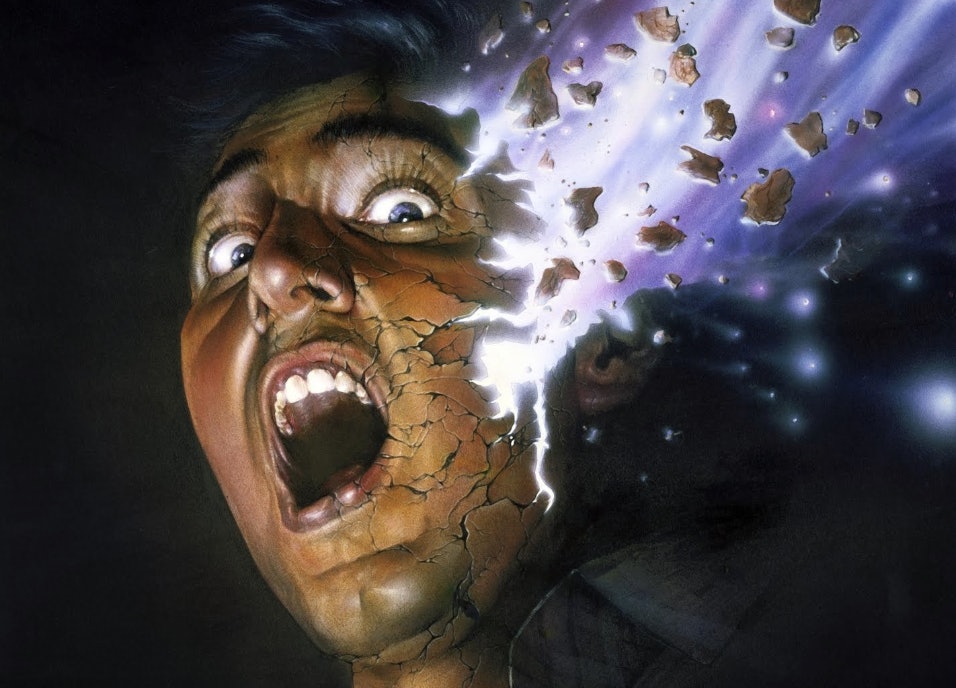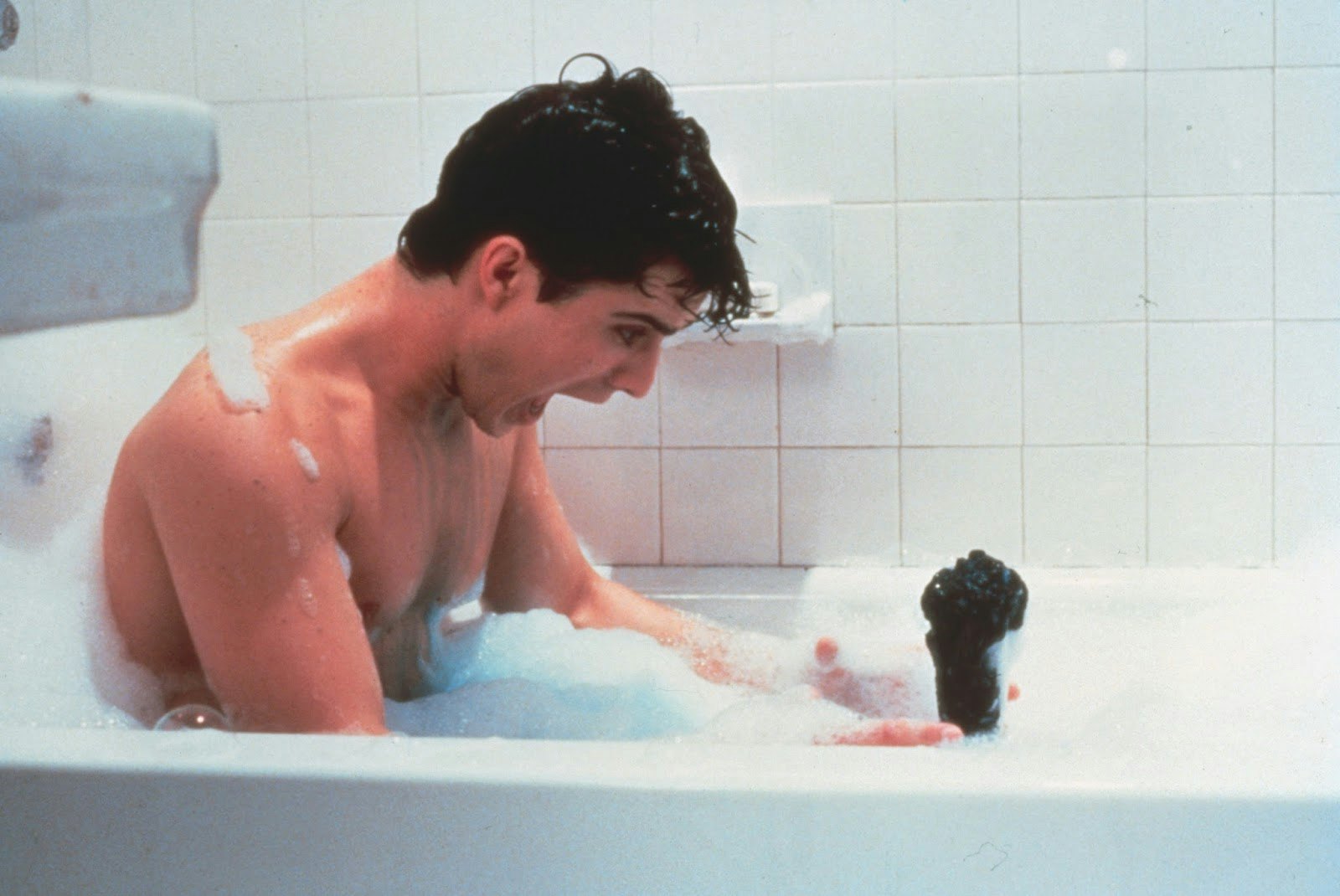
What’s the most effective anti-drug movie of all time? Harrowing efforts like Requiem for a Dream, The Basketball Diaries, and The Panic in Needle Park probably first spring to mind. But what about the ‘80s monster flick in which a jazz-singing, medieval-aged, phallic-shaped parasite causes its host to unknowingly embark on a cannibalistic murder spree?
Released in the prime of then-First Lady Nancy Reagan’s “Just Say No” campaign in April 1988, Brain Damage is partly based on writer/director Frank Henenlotter’s real-life addiction. Yet while his drug of choice was cocaine, the film’s metaphorical substance combines the hallucinations of LSD with the needle rushes of heroin, a cocktail that quickly turns the protagonist into a literal hollowed-out shell of his former self.
Making his screen debut, future soap opera regular Rick Hearst (General Hospital, Guiding Light) stars as Brian, a man who begins experiencing (and enjoying) visions brought on by a talking worm named Aylmer. During their first face-to-face encounter, the latter offers a Faustian pact: he’ll continue to inject the fluid from his mouth, a hideous mass of wayward teeth and tentacles, into Brian’s neck in exchange for a “walk.”
Initially, Brian is unaware “walk” is code for allowing Aylmer to feast on unsuspecting members of the public. First to die is the nightwatchman at a scrapyard that in Brian’s mind is now a kaleidoscopic utopia. Second is the poor clubber who suffers the ignominy of death by fellatio. The latter scene is so graphic it reportedly caused several crew members to walk off the set.

As his brother/roommate Mike (Gordon MacDonald) and girlfriend Barbara (Jennifer Lowry) grow increasingly concerned about Brian’s state of mind, the new junkie finally discovers the horrible truth. A confrontation with Morris (Theo Barnes), an elderly man who used to own Aylmer, provides the necessary exposition dump. It turns out the parasite has survived for centuries by latching onto various hosts. And when it feeds on human brain matter, rather than animal, its power becomes too strong to overcome.
It’s here where Brain Damage truly leans into its drug metaphor. Holed up in a grotty motel room, Brian tries to kick his habit during a withdrawal process in which his tormentor surreally bursts into a Rat Pack-style number titled “Aylmer’s Tune.” However, as he writhes around in agony to the sound of continual taunts (“Ready to beg for it, Brian? Ready to crawl across the floor and plead for my juice? No? Not yet? Well, give it a few more hours, Brian”) and horrific visions of intestines emerging from his ears, he soon realizes he’s already a lost cause.

The utter grimness and helplessness of such scenes like this contradict some critics’ arguments the film actually glorifies drug abuse. Sure, Brian is shown ascending to a state of euphoria every time Aylmer unleashes his fluid directly into his brain. The comedown, though, is always more potent than the high, and by the end of the 86-minute tale, he’s lost his partner, his purpose in life, and even a large part of his forehead. It’s hard to envisage any previous clean-living viewer suddenly trying to source their local drug dealer in response.
“Drugs are bad, mmmkay” isn’t the only message Brain Damage appears to be selling, though. Although Henenlotter himself has insisted the film isn’t deliberately anti-sexual, it’s hard to deny there’s an overwhelming air of dread whenever things get physical. Not content with choking one poor woman from the confines of Brian’s zipper, Aylmer also takes out Barbara as she’s kissed by Brian in a swallowed-whole manner which evokes Liza Minelli and David Gest’s wedding.
You could also interpret the latter as a punishment for getting into bed with Mike (in a striking dream scene, Barbara also engages in a threesome that borders on incestuous). Then there’s the fact the effects team was actively encouraged to make the murderous monster resemble a black dildo. Whether knowingly or not, the AIDS crisis of the ‘80s appears to have informed the movie just as much as the crack epidemic.

While all this sounds like a slightly deranged take on an after-school special, Brain Damage is still grounded firmly in the schlocky horror of the VHS age. Aylmer is a particularly impressive display of stop-motion animation and puppetry, his gross, googly-eyed appearance and playful demeanor sitting somewhere between Little Shop of Horrors’ Audrey II and South Park’s Mr. Hankey.
Henenlotter, who made his name six years earlier with the equally warped conjoined twin horror Basket Case, also showcases a visual flair elsewhere, whether it’s bathing Brian’s dingy, poky apartment in atmospheric neon blue hues or romanticizing the graffiti-strewn streets of New York. As with its predecessor, Brain Damage gets a lot out of its blatantly paltry budget.

It’s also consistently funny, often at times when you least expect it. See how the tension of Barbara’s death scene is punctuated by Brian nearly burping up the crazed critter. And legendary horror show host John Zacherle’s baritone is the perfect foil for Aylmer’s array of deadpan zingers. “Is she dead?” Brian asks dimly after learning the parasite devoured a woman’s brain the night before. “Of course she’s dead, what are you kidding?” comes the reply.
Brain Damage’s sense of humor and determination to push the boundaries of decency means it’s rarely talked about in the same breath as the more sobering depictions of drug abuse. But who said strong messaging always needed to be delivered in good taste?







